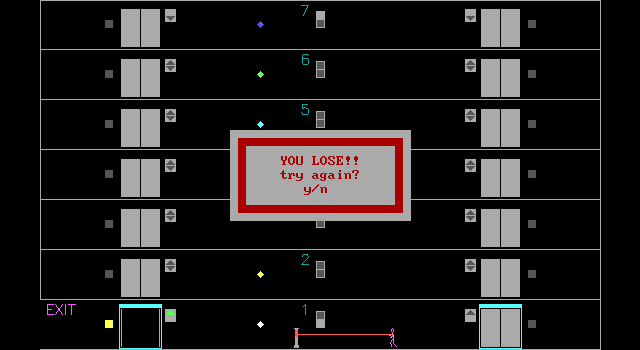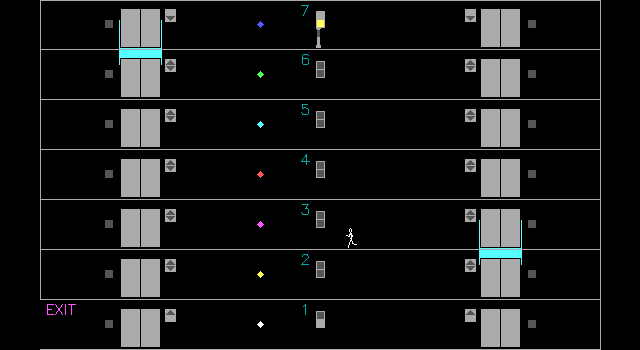Retro Replay Review
Gameplay
Elevators from Hell delivers a deceptively simple premise with surprisingly deep puzzle-stealth mechanics. Your goal is to collect seven tokens—one per floor—and then make your escape before the Robo Guard catches up to you. At first glance, the elevator panel system seems straightforward: press a button and the nearest elevator arrives. But once you introduce the Robo Guard’s patrol routes and the random elevator behavior, every move becomes a tense calculation.
(HEY YOU!! We hope you enjoy! We try not to run ads. So basically, this is a very expensive hobby running this site. Please consider joining us for updates, forums, and more. Network w/ us to make some cash or friends while retro gaming, and you can win some free retro games for posting. Okay, carry on 👍)
Movement and timing are at the core of the experience. You’ll need to weave between elevators, lure the Robo Guard away, and dash to grab tokens in split seconds. Because the panel always calls the closest elevator, you can manipulate enemy positioning by summoning elevators at the right moments. This emergent puzzle element ensures that no two runs feel identical, and mastering this mechanic is immensely satisfying.
The difficulty curve ramps up quickly. Early floors teach you the basics—avoid line of sight, bait guards, grab tokens—but by floor four or five, you’ll be juggling multiple elevators, backtracking to reset guard patrols, and planning routes that minimize risk. There’s a fine line between thrilling and frustrating, and Elevators from Hell mostly stays on the fun side of the spectrum, though newcomers may appreciate a practice mode or easier difficulty setting.
Controls are tight and responsive, whether you’re using a gamepad or keyboard. The simple two-button panel interface means you spend less time fiddling with inputs and more time strategizing. For players who love speedrunning, the game’s timer and optional leaderboards provide an excellent excuse to perfect your route and shave off precious seconds.
Graphics
Visually, Elevators from Hell opts for a stylized pixel-art aesthetic that combines retro charm with modern polish. Each floor’s palette shifts subtly—icy blues in the server room, dim reds in the reactor zone, and sickly greens in the biotech labs—giving each level its own personality. The crisp sprites and smooth elevator-door animations make traversing the building a pleasure.
The Robo Guard design is especially memorable: a towering automaton illuminated by a glowing red eye and trailing neon-blue circuitry lines. Its patrol animations are fluid, telegraphing exactly when it’s about to fire its deadly laser. This clarity in design strikes a good balance between tension and fairness; you always know when you’re in danger, but the threat never feels cheap.
User interface elements are clean and unobtrusive. The elevator panels light up to show which floor they’re called to, and tokens sparkle softly to guide your eye without breaking immersion. Sound effects—like the “ding” of a door closing or the far-off whine of Robo Guard servos—enhance the atmosphere without overpowering the minimalist soundtrack.
While the game doesn’t push cutting-edge 3D graphics, its cohesive art style and attention to detail create a rich environment. Subtle visual cues, such as flickering lights on low-power floors or steam vents in the maintenance shafts, not only add flavor but can also hint at safe zones or potential traps.
Story
Elevators from Hell isn’t heavy on narrative, but it weaves a tight premise that keeps you engaged: you’re an intruder in a high-security research facility gone haywire. Your seven tokens are rumored to be data cores containing the facility’s deepest secrets—secrets you need to expose before the entire building self-destructs.
Throughout your ascent, environmental details hint at the facility’s backstory: bloodstains in the bio-lab, broken consoles in the AI development wing, and cryptic logs displayed on terminal screens. These morsels of lore invite you to piece together what went wrong—and why a single Robo Guard patrols the entire structure rather than an army of machines.
Although there’s no fully voiced cutscene or sprawling dialogue tree, the sparse storytelling complements the game’s relentless pacing. You never lose momentum to long exposition dumps; instead, you absorb the tale in bits and fragments as you dash between floors, tokens in hand.
For players who crave a more extensive narrative, the minimalist approach may feel too lean. However, for those who enjoy environmental storytelling and filling in the blanks themselves, the game provides just enough context to make every floor feel meaningful and urgent.
Overall Experience
Elevators from Hell excels at delivering a distilled, high-intensity puzzle-stealth challenge. Its core loop—summon elevator, avoid Robo Guard, grab token, repeat—might sound repetitive, but the procedural unpredictability and precise controls keep each run feeling fresh. Once you’ve unlocked a few floors, you’ll find yourself hooked on the “just one more try” mentality.
The game’s bite-sized structure makes it perfect for quick play sessions or marathon speedruns. A typical run takes 10–15 minutes, so it’s easy to slot into short breaks or tackle in one sitting. The leaderboard integration and built-in timer encourage replayability, challenging you to refine your strategy and climb the ranks.
On the downside, the steep difficulty spike around mid-game might be off-putting for casual players. An adjustable difficulty setting or optional hint system could broaden the game’s appeal. Additionally, some might wish for a richer soundtrack or more varied enemy types to mix up the formula.
Overall, Elevators from Hell is a lean, addictive puzzle-stealth hybrid that will appeal to fans of tight mechanics and retro-inspired visuals. Its challenging gameplay, clever elevator dynamics, and suspenseful pacing make it a standout indie title well worth your time—provided you’re ready to face its relentless Robo Guard.
 Retro Replay Retro Replay gaming reviews, news, emulation, geek stuff and more!
Retro Replay Retro Replay gaming reviews, news, emulation, geek stuff and more!







Reviews
There are no reviews yet.